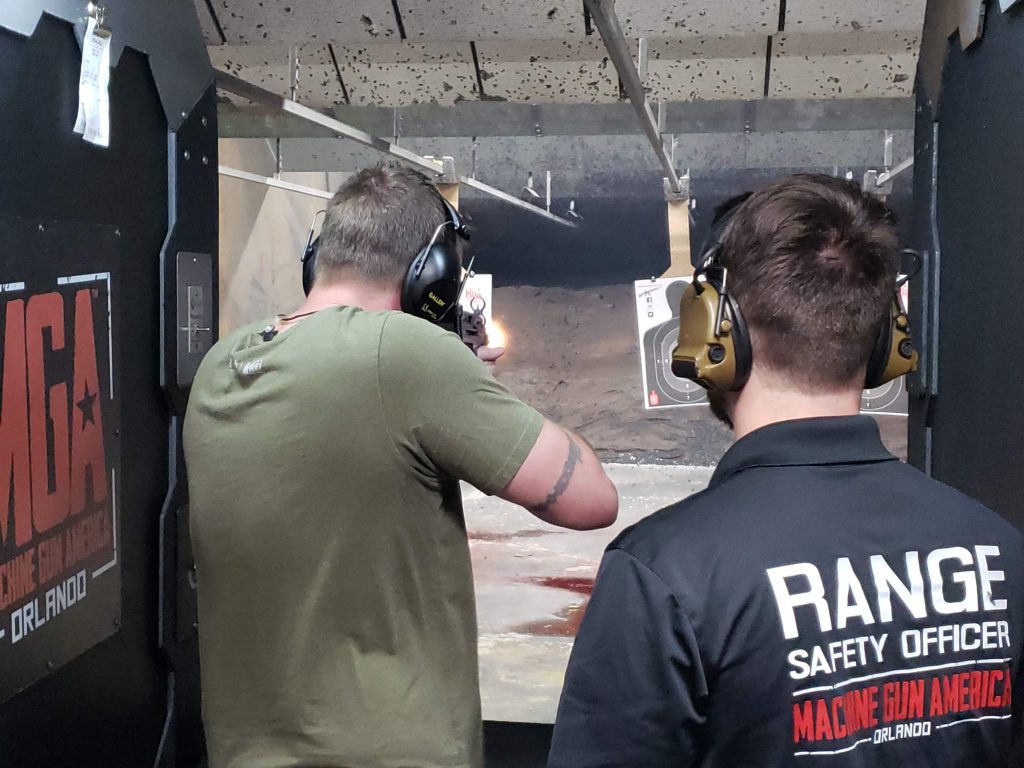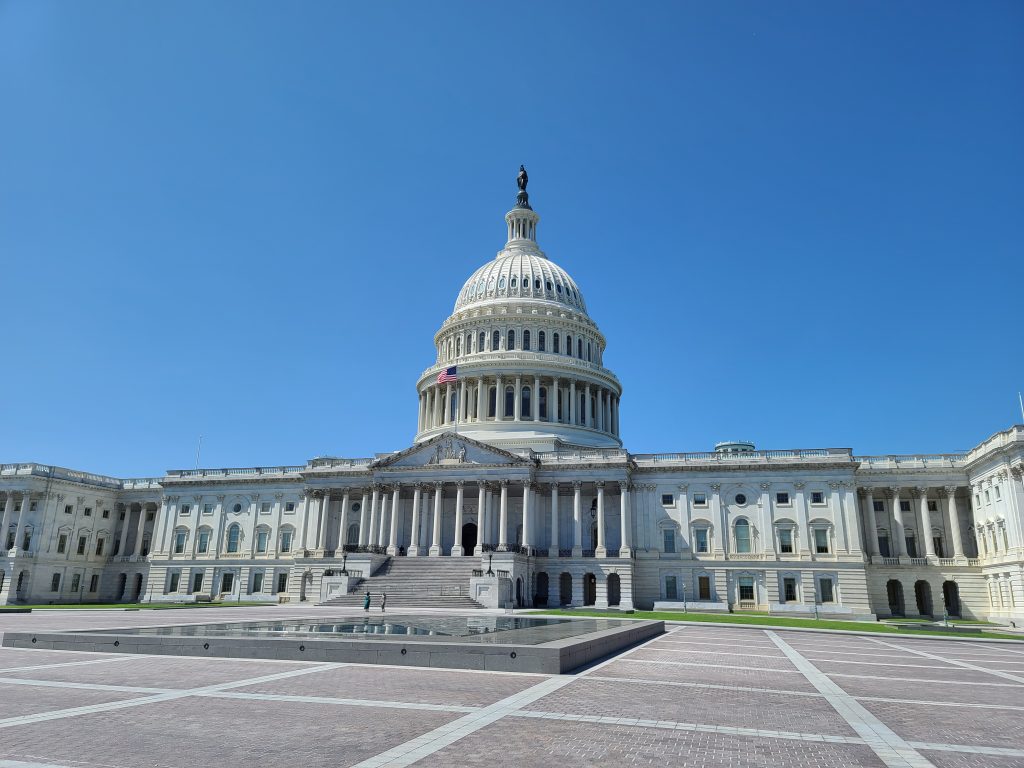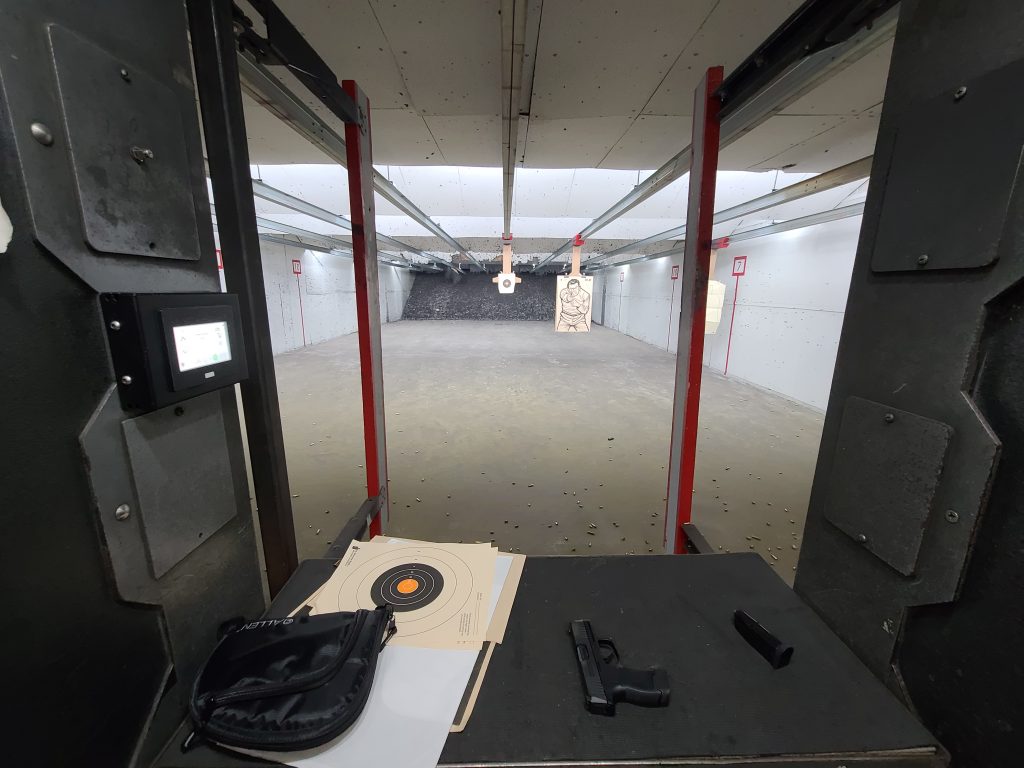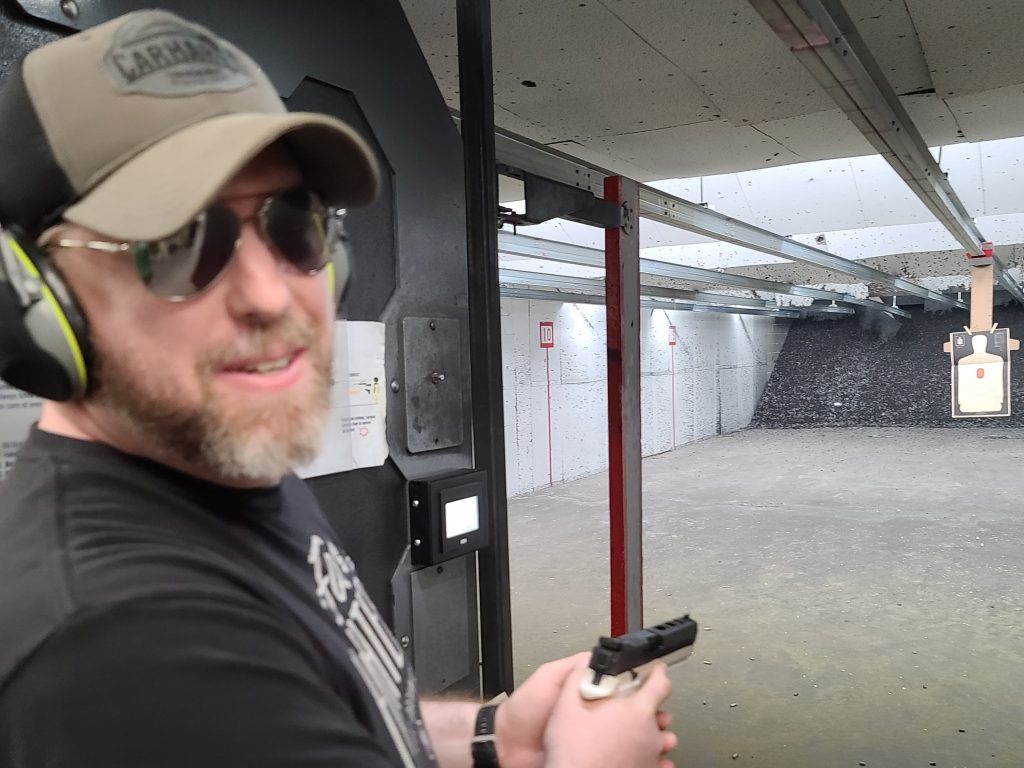If, as the industry has estimated, there continue to be millions of Americans becoming gun owners, it’s the biggest factor for gun politics in years. It’s a pretty simple premise. The more Americans become gun owners, the less likely America is to adopt new gun restrictions.
There is a bit more nuance to the calculation and it isn’t likely to play out immediately. But, it’s the most important gun news right now in my estimation and it isn’t getting enough attention. So, I talked looked at it a bit more in-depth this week.
Contributing Writer Jake Fogelman, on the other hand, took a look at a proposal that puts a new spin on the debate over civil protections for online publications. He explains how a pair of Democrats are bringing the debate over Section 230 to internet gun marketplaces, and why it is unlikely to help reduce crime despite their claims.
Plus, we have National Review’s Jim Geraghty on the podcast to talk about President Biden’s failed ATF nomination and the NRA’s turmoil. And, we have the exclusive final part of my in-depth interview with activist Rob Pincus.

Analysis: What Impact Will Creating 11.6 Million New Gun Owners in a Year and a Half Have? [Member Exclusive]
By Stephen Gutowski
There’s a simple addition equation at the core of the most significant single factor in the future of gun politics: 8.4 + 3.2 = 11.6.
That’s how many millions of Americans the National Shooting Sports Foundation estimates were added to the gun-owning community over the past year and a half. The firearms industry trade group reported late last week its latest dealer survey found 3.2 million first-time buyers were created in the first half of 2021. That’s after it estimated there were 8.4 million first-time buyers in 2020 based on its previous survey.
If this number is accurate, and there is some question over whether or not it is, it could have monumental impacts in the short and long term.
One of the long-term effects is likely to be a shift in American gun politics. As you might imagine, gun owners have historically been less supportive of restrictions on gun ownership and use. With millions more adults (and, therefore, voters) owning guns, it may have an impact on the level of support gun-control measures can expect moving forward.
Hobbies and passions take time to develop, so this isn’t an effect that’s likely to reach its full effect for years. People’s politics tend to change in a similarly slow fashion. But, it’s fair to expect some percentage of those new gun owners will develop into gun voters, and some portion of them will become motivated activists. Millions of new gun voters and tens or hundreds of thousands of gun activists would significantly impact the politics of guns–particularly if they’re active in places and communities that haven’t previously had many gun owners.
This is especially true when looking at some of the fastest-growing demographics of gun ownership. Women and minorities have tended to favor gun restrictions at a higher rate than White males. But NSSF found minority customers, especially African Americans, were growing at a faster rate than White customers. And a new survey from researchers at Harvard and Northeastern University found half of all new gun owners since 2019 were women, though they found a lower overall number of new gun owners.
The more immediate impact is on gun and ammo supply. The last year and a half has been one continuous shortage. The perfect storm of motivation to be armed has come, and it hasn’t yet gone.
It’s easy to see why ammo manufacturers haven’t been able to keep up. And why they’ve warned the shortage could carry on for years. If each of the estimated 11.6 million new first-time gun buyers bought just 100 rounds of ammo, the industry would need to produce 1.16 billion rounds more in the past year and a half than they had in 2019 just to keep up. And that’s before you factor in all of the other gun owners who have increased their ammo buying.
Things will only worsen on the ammo supply front now that President Joe Biden has banned new import permits for Russian-made rounds.
Plus, 2021 isn’t over yet and the fourth quarter of the year is when sales tend to increase the most. Coincidentally, it’s also when several of President Biden’s executive orders banning most pistol braces and expanding the ATF’s power to regulate gun parts go into effect. Concern over new gun bills usually drives people to gun stores.
That likely means millions more Americans will become new gun owners by the end of the year. And the effect of expanded gun ownership will increase even further.

Podcast: National Review’s Jim Geraghty on NRA Turmoil, and Fallout From Biden’s Failed ATF Nomination
By Stephen Gutowski
This week, I spoke with National Review’s Senior Political Correspondent Jim Geraghty. As you might gather from his title, Jim has a lot of experience in covering and analyzing politics. He’s also spent a good amount of time covering gun politics and, in particular, the National Rifle Association.
That’s why I wanted to have him on to discuss the failure of President Joe Biden’s ATF Director nomination. Jim also provides some key insight into what will likely come next in President Biden’s efforts to install a director as well as his pursuit of new gun-control measures.
Jim also gave us his take on what’s going on with the NRA and where the corruption charges levied against it in New York are headed.
Plus, Contributing Writer Jake Fogelman and I talk about the latest estimates on how many new gun owners have been created this year and what that means for the long-term future of guns in America. And we discuss the last two installments of my exclusive, in-depth interview with gun activist Rob Pincus.
You can listen to the full podcast on your favorite podcasting app or by clicking here.
You can also watch the video podcast on The Reload‘s YouTube channel.

Analysis: How Section 230 Reform Is Just the Latest Attempt to Impose Civil Liability On the Gun Industry [Member Exclusive]
By Jake Fogelman
Section 230, the legislative bugaboo of Republicans and Democrats alike, has become entangled with gun control.
Senate Bill 2725 was officially introduced by Senator Richard Blumenthal (D., Conn.) this week. Entitled the Accountability for Online Firearms Marketplaces Act of 2021, the bill would remove Section 230 protections for any online service that facilitates transactions of firearms or firearm accessories, hosts listings of private person-to-person sales, or that posts 3D-gun files or instructions on how to complete unfinished receivers.
Debate surrounding Section 230 of the 1996 Communications Decency Act is most notably associated with social media, with opponents across the political spectrum accusing it of either providing legal cover for big tech companies to censor conservatives or to spread misinformation, depending on who you ask.
What the provision actually says is “No provider or user of an interactive computer service shall be treated as the publisher or speaker of any information provided by another information content provider.” In other words, online service providers aren’t liable for third-party content posted on their websites just because they might moderate it.
According to the sponsors of the bill, the attempt to remove this civil liability shield from online firearms marketplaces is a way to prevent people prohibited from owning a firearm from obtaining them online.
“It’s time to start holding accountable those who turn a blind eye to illegal gun sales on their platforms,” Senator Dianne Feinstein (D., Calif.), a co-sponsor of the bill, said in a press release. “The only way to reduce the scourge of gun violence plaguing our communities is to close loopholes that allow prohibited people to obtain guns.”
The misuse of the word loophole aside, let’s say Senator Feinstein’s comments are truthful and the goal of the bill really is to reduce the ability for prohibited possessors to obtain firearms. The text of the bill says:
Every year, unlicensed sellers post more than 1,000,000 advertisements on online firearms marketplaces in States that do not legally require a background check. Individuals with criminal histories and other prohibited purchasers rely on these postings to evade basic background check laws and procure firearms. One study found that nearly 1 in 9 prospective gun buyers who respond to advertisements from unlicensed sellers on a major online firearms marketplace would not pass a background check, which is a rate that is 7 times higher than the denial rate in contexts where background checks are required.
The bill does not provide a citation for the referenced study, but again we’ll say for argument’s sake that the claim is accurate. Even with those concessions made, it seems a more efficient strategy would be to target those clearly identifiable individuals who are attempting to skirt federal law by unlawfully seeking a firearm, rather than punishing lawful online marketplaces.
The inclusion of the study itself gives away the inefficiency of the strategy. The study identified that nearly 1 in 9, less than 11 percent, of all prospective buyers were allegedly seeking to obtain a gun unlawfully. While 11 percent is certainly not nothing, it highlights the misallocation of legislative attention involved in pursuing regulations against a class of websites where nearly 90 percent of the activity is lawful commerce, by their own study’s admission.
The reason that the amount of identified criminality on these sites is so low is because we’ve known for a long time that criminals by and large do not obtain their firearms this way. One study from the University of Pittsburgh found that in nearly 80% of all gun crimes, the perpetrator was in possession of a weapon that legally belonged to someone else. Another study from the Bureau of Justice Statistics surveyed state and federal prisoners and found that the incidence of guns being obtained online was too rare to be given its own category. Instead, it was grouped into the “other” source category where it was associated with less than six percent of the inmates surveyed.
All this is to say that a bill repealing civil liability from online firearms marketplaces will not have any meaningful impact on criminals obtaining firearms. Criminals by and large obtain their weapons from theft, the black market, and straw purchases involving people close to them.
Instead, the bill is likely to have a chilling effect on internet speech and lawful online commerce in firearms and accessories. Online gun marketplaces, such as Armslist, will be much less likely to facilitate postings for gun sales among its users if it knows at any moment it could be sued if a gun turns up in a crime.
Evidence of this can be seen in similar websites following previous Section 230 repeal bills. In 2017, Congress passed the Stop Enabling Sex Trafficking Act (SESTA) which created a new Section 230 carve-out for sex-trafficking-related content posted by third parties. The act was passed specifically to target sex-traffickers online, but it also had the unintended consequence of affecting platforms—like Reddit and Craigslist— not engaged in such content who simply wanted to shield themselves from liability from posts that escaped the oversight of their moderators.
Luckily for Reddit and Craigslist, removing certain pages was enough to solve their problems. Their websites deal with a multitude of content and commercial activity outside the scope of SESTA. Online marketplaces like Armslist are not so fortunate in that their entire business model would be subject to civil liability under S. 2725, making it extremely likely those sites could be left with no other choice than to shut down permanently.
This is probably the actual goal of the bill. Lawmakers are aware of the aversion businesses have to costly lawsuits. The same logic is at play in the push to repeal the Protection of Lawful Commerce in Arms Act (PLCAA), which shields gun makers and dealers from liability over the misuse of their products by third parties. It is likely that opening up gun makers and sellers to lawsuits on multiple fronts will create a war of attrition. As legal costs mount, gun companies will be put out of business and gun sales will decrease.
It is important to note that with the current make-up of the Senate, and the fierce resistance to gun control shown by elected Republicans, the odds of this bill going anywhere are very slim. However, it is not unreasonable to imagine a similar bill reappearing in a future Congress with clearer majorities. It should also serve as a warning to many Republicans, some of whom have previously called for blanket Section 230 repeals, about the unintended consequences of such a political strategy.

A Gadfly and an Influencer: Part 3 of The Reload’s Rob Pincus Interview [Member Exclusive]
By Paul Crookston
In this final section of his interview with Stephen Gutowski, gun-rights advocate Rob Pincus makes the case that he’s helping by being a gadfly in the gun community. He argues the responsibility of gun owners goes hand-in-hand with their rights, and so it’s critical that gun advocates address tough issues such as negligence. But he also defends himself against the idea that he’s courted controversy or actively tried to irritate others in the gun-rights movement. Rather, he says it’s about policing his own side in order to get results.
Pincus has high hopes for what can be accomplished in the cause of gun rights. He says his goal is to push gun control far enough to the fringes that neither major party can maintain an anti-gun agenda. He thinks that will take serious self-policing and a heavy dose of influence but it’s a goal worth having. The intentions he has for his activism are where we begin.
The following is the last section of Gutowski’s conversation with Pincus, lightly edited for clarity and exclusive for members:
Stephen Gutowski: Where do you see your activism headed over the next several years? What are your key areas of focus? What issues really animate you moving forward?
Rob Pincus: I act, I know, as a little bit of a gadfly to the gun community. Have for a long time. I did it at first very centered in the training community, and now more of the gun community at large. And I don’t shy away from that role. And in some ways, I enjoy it. I think that somebody needs to be there to raise their hand when we say there are 2 million defensive gun uses every year and say, “That’s a made-up number.” And especially when it’s usually reported as 500,000 to 2 million. You now have 400% of your original number—that’s not even a statistic. It’s just a made-up number. So what are we really saying? When we make it too easy for the other side to attack us or to dismiss our arguments, we hurt ourselves. That’s a disservice to the gun community.
When we say things that the only people that even want to hear it or accept what we’re saying are already on our side, we’re not doing advocacy. So we have to be a little braver, we have to confront real issues like gun negligence. We have to confront issues like parents who let their kids get their hands on loaded guns in unsupervised situations. We have to confront issues like people who carry guns when they go out drinking because “Well, the law says I can” or “No one’s ever going to know.” We need to start policing our own a little bit better. So I’ll continue to be very active in that way and call for people to exercise responsibility at least as much as they exercise their rights.
Personally, I do think that an important goal for us is influencing the people outside of the gun community to the point where there is no taste, there is no tolerance for an anti-gun platform in any major American political party. And that requires us to not be xenophobic, it requires us to admit our faults, it requires us to acknowledge the risks that come with gun ownership and clearly work to mitigate those risks in a way that isn’t combative or fearful, but in a way that is proud and responsible.
SG: Do you see that potential for the polarizing nature of your activism—the number of people that don’t like you inside the movement—as a potential hindrance for what you’re trying to accomplish? Is there some point where pissing off people becomes detrimental rather than an asset to what you’re trying to do?
RP: Sometimes, the impression is that I’m pissing people off on purpose, or I’m being controversial on purpose, and there’s a huge difference between not worrying about controversy and seeking out controversy. I would love it if the entire gun community just said “Yeah, what Rob is saying makes sense. I get it. And I don’t care about the fact that he uses a different gun than I like or he taught to stand on the range in a different way than I did, or he said something about the guru I liked in the training world 20 years ago.” I would love that. It would be much easier to get through life with everybody liking you. But when I really look around, that’s not the case. When people change things in the world, when people are influential, there are going to be detractors, especially from the old guard that’s being sort of ignored or challenged by the new thought process. So I don’t shy away from that.
I think that the detriment is the polarization, where someone says, “Well, I don’t agree with this guy 100 percent, so I’m not going to listen to anything he says. I’m going to fight against it.” And there’s far too much of that all around the world, especially in American politics. So I think the best way to change that is to continue to reach out that hand of collaboration, or conversation at the very least. And that’s inside the gun community and outside of the gun community. Everyone should be capable of sitting down at the table and understanding one another, even if they don’t agree.
SG: But you don’t think you add to that? I understand you’re saying you’re not intentionally creating enemies, but do you think that sometimes the way you approach issues or other people in the movement inadvertently adds to that?
RP: Yes, absolutely. And the importance is, I will sit down and talk to anybody. There’s one of these young trainers who’s now talking about politics on YouTube. Did a really effective hit piece on me back in March based on, again, disinformation that suggested I was working with the Brady Campaign. Completely false, completely made up, or just some kind of weird, gross misunderstanding. The idea that I wanted to work for the Biden campaign—first of all, gun-rights people should want me to work for the Biden administration. If I were sitting in the White House, believe me, it’s a lot better than having Shannon Watts sitting in the White House, or [David] Chipman sitting in the White House or anyplace else in the American government. But that being said, this guy did this very effective hit-piece video—I truly think out of ignorance, I think he bought into some stuff he read or heard, didn’t know any better. Over the course of a week or two, I did reach out to that guy several times, directly and through intermediaries. He won’t sit down and have the conversation. His followers, his fans are going to continue to dislike Rob or disrespect Rob, but how much time am I going to lose on that? Here’s a kid that won’t even have a direct conversation. Guy’s got no integrity, guy’s got no backbone, guy’s got no ability to have a debate or a discussion. I’m not going to worry about that guy not liking me for much more than that first week or so where I tried to make it better. And I’ll move on.
SG: But I’m asking if you feel that your approach or the things that you say and do sometimes engender this kind of reaction, even if you’re not intending it to.
RP: Absolutely, but that’s the point. You can’t avoid that if you’re challenging the orthodoxy, if you’re saying something outside of the echo chamber, if you’re calling out the bad actors. That’s going to happen. So all I can do is seek to clarify or educate people that have a misunderstanding—at least if somebody accurately describes what I think. Let’s go back to training because it’s really easy: If somebody accurately describes that I think that you should practice your defensive shooting in a lowered center of gravity, weight-forward stance, with your knees bent and your hips closed, that is accurate. If somebody says I think that you should shoot from the hip and not worry about aiming, that is not true. So if somebody doesn’t like the fact that I teach a lower center of gravity stance, I want them to understand why I teach it. If somebody really thinks I teach something that I don’t, how far can or should I go to correct their misunderstanding when literally all they have to do is watch one of my videos, read one of my books, listen to any of the hundreds of instructors I’ve certified across the country to find out what we really teach? The willful ignorance and pandering to one’s own fans isn’t something I will ever lose sleep or lose a step over. So does it inadvertently cause problems? Yes. Is it something I think I need to change or do differently? No.

Personal Update: Rangetime
I’ve actually been able to do a good bit of shooting recently which is a nice change of pace. I went to the range with some friends last week. On Saturday, I trained a friend’s son on proper firearms handling for his 12th birthday.
It’s been rough going for the past year and a half since the gun and ammo buying surge started. That’s not likely to change anytime soon since so many people are still becoming new gun owners like I discussed above. But, I will say that range ammo is a bit more available than it used to be. So, that’s a good sign!

It was nice to get out and shoot my P320 X-Five and my P365. I guess I’ve been on a bit of a Sig kick lately. Replacing the 365’s striker assembly seems to have ironed out the kinks I had with it. And the 320 is fully broken in now which means it’s buttery smooth. I love it!
And, I have to say that my student this week was a real natural. I find it’s always easier to train folks who’ve never shot before. I guess they just have no bad habits to break which makes things pretty simple.
Anyway, I hope I can get to the range this frequently going forward. We’ll see how much free time running the site allows lol. Either way, I hope all of you are able to get some training in yourselves!
That’s it for now.
I’ll talk to you all again soon.
Thanks,
Stephen Gutowski
Founder
The Reload






Only Members can view comments. Become a member today to join the conversation.